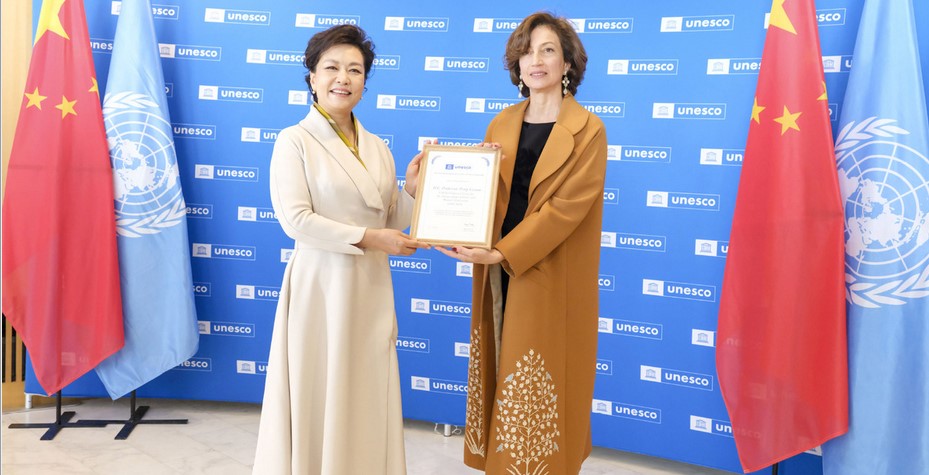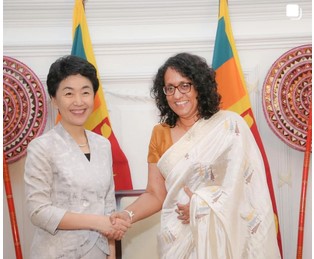By Sugeeswara Senadhira/Daily News
Colombo, November 29: Sri Lanka has a strong foundation for gender equality, largely attributed to its universal education policies and progressive health initiatives. However, systemic challenges persist.
The vision of women’s empowerment as a cornerstone for sustainable development has taken center stage in global discussions, with recent high-profile events emphasizing the importance of fostering gender equality through collaboration and innovation between China, Sri Lanka, and international stakeholders at large.
Last Sunday (Nov 24), Madam Sun Haiyan, Deputy Minister of the International Liaison Department of the Chinese Communist Party (IDCPC), met with Sri Lankan Prime Minister Harini Amarasuriya at the historic Temple Trees in Colombo. The meeting marked a new chapter in bilateral cooperation, with a major focus on strengthening women’s empowerment initiatives through partnerships in education, vocational training, and digital inclusion.
China’s top women leaders have visited Sri Lanka in recent years. Madam Peng Liyuan, wife of President Xi Jinping came to Sri Lanka when her husband made an official visit and she attended several functions including the distribution of Chinese gifts to women and children. Earlier this month, Madam Peng Liyuan, who is United Nations Educational, Scientific and Cultural Organization (UNESCO) Special Envoy for the Advancement of Girls’ and Women’s Education, visited the UNESCO headquarters in Paris. During the visit, UNESCO Director-General Audrey Azoulay applauded Peng’s extensive contributions to global women’s education and reaffirmed UNESCO’s readiness to strengthen its partnership with China to drive innovative initiatives for girls’ and women’s education worldwide.
In November 2023, President Xi Jinping sent Madam Shen Yiqin, State Councillor of China to Sri Lanka as his Special Envoy to interact with Sri Lankan leaders with a special focus on expansion of Chinese assisted programmes on women and child welfare.
Sri Lanka has long been a pioneer in promoting gender equality. Universal access to free education since 1945 has led to one of the highest female literacy rates in South Asia, exceeding 90%. Women’s access to education has played a pivotal role in enabling their participation in politics and the workforce. Programs such as Well Woman Clinics focus on reproductive health, while vocational training and microfinance initiatives have opened pathways for economic independence, particularly in rural areas. However, challenges like low female labor force participation (35%) and socio-cultural norms remain barriers to full empowerment.

China, on the other hand, integrates women’s empowerment into its broader economic and social policies. The All-China Women’s Federation (ACWF) and legal frameworks like the Law on the Protection of Women’s Rights and Interests advocate for gender equality and labor protections. Women constitute 40% of the labor force, thanks to China’s emphasis on STEM education, vocational training in rural areas, and entrepreneurial initiatives. These strategies have created a robust framework for fostering gender equity, making China a role model for developing nations.
By comparing these two nations’ historic efforts, it is evident that their collective experience can create a transformative model for women’s empowerment globally, particularly in the context of achieving Common Prosperity.
Common Prosperity is a foundational vision in China’s long-term development strategy, emphasizing inclusive growth, reduced inequalities, and a more balanced distribution of wealth and resources. Introduced by President Xi Jinping in 2021, it aims to ensure that economic development benefits all sectors of society, with a focus on equity, sustainability, and people-centered policies.
Key Pillars of Common Prosperity Program includes, income growth for low-income groups, uplifting marginalized communities by addressing wage gaps and promoting economic opportunities, balancing regional development by reducing urban-rural disparities and ensuring equitable access to resources and services, encouraging high-income individuals and businesses to contribute to society through taxation, philanthropy, and public welfare programs, integrating social well-being and environmental sustainability into economic growth.
Empowering women is not only a moral imperative but also a strategic necessity for achieving Common Prosperity. Reliable data from developing countries shows that in rural families with better economic conditions, women are often the primary decision-makers in financial arrangements and the driving force behind family businesses.
Women’s empowerment directly contributes to Common Prosperity as it enhances household income. Women’s ability to make informed financial decisions improves family savings, investments, and overall well-being. Empowered women prioritize expenditures that enhance long-term stability, such as education, healthcare, and entrepreneurial ventures.
Women play a central role in agriculture, small-scale manufacturing, and local trade in rural communities. Providing them with access to resources, training, and technology enables them to expand family businesses and uplift their local economies.
By equipping women in underdeveloped regions with skills and opportunities, governments can bridge the urban-rural divide and create balanced economic ecosystems.
Studies show that women are more likely than men to reinvest their income in their families and communities, creating a ripple effect that benefits education, health, and social cohesion.
Women-Centered Policies for Common Prosperity
To achieve Common Prosperity, policies must prioritize women’s empowerment in these key areas by expanding microfinance programs for rural women to enable them to access credit for family enterprises and introducing financial literacy programs to strengthen their decision-making abilities.
Another requirement is vocational training and skill development as it will ensure access to digital skills training through frameworks like DEVES to help women integrate into the digital economy. Promoting STEM education for young girls will prepare them for high-growth industries.
In order to support female entrepreneurs, the women-led businesses should be provided with access to capital, markets, and technology, fostering job creation and innovation and establish mentorship networks to connect women entrepreneurs with industry leaders.
DEVES (Digital Economy-based Vocational Qualifications Framework for Developing Countries) is a groundbreaking initiative co-developed by Sri Lanka and China. The Tertiary and Vocational Education Commission of Sri Lanka and the Regional Headquarter of UNESCO-UNEVOC South Asia Cluster based in Sri Lanka are the stakeholders from Sri Lanka side for the DEVES project. It is the World’s first vocational education framework fully powered by Human-AI Collaboration (HACOL) technologies.
Main features of DEVES are harnessing AI to personalize vocational training for learners while integrating human oversight for practical application, aligning with international vocational standards, including the HS Code System, to ensure relevance in global markets and empowering the workforce by equipping workers with future-ready skills tailored to the digital economy, ensuring competitiveness in high-demand industries.
By focusing on women’s vocational training, DEVES directly addresses gender disparities in workforce participation. Women are empowered with digital skills that enhance their employability, income potential, and entrepreneurship opportunities.
The Global Initiatives Implementation Alliance (GLIA) is going to propose Sri Lanka and China to jointly launch the Global Action on Women’s Digital Empowerment (GLAWODE), with the DEVES 4 SDGs Initiative as its cornerstone. This transformative initiative aims to create a futuristic empowerment mechanism that leverages Human-AI Collaboration (HACOL) technologies to ensure women can thrive in the global digital economy.
GLAWODE is designed to empower women worldwide—especially in remote areas and vulnerable communities—by providing them with the tools, skills, and resources to actively participate in and benefit from the digital economy. This initiative aligns with the principles of Common Prosperity, addressing income disparities, enhancing economic inclusion, and fostering balanced regional development.
Special emphasis will be placed on equipping women in rural areas to become drivers of local economic transformation. By addressing regional disparities, GLAWODE ensures that women from remote areas have equal access to resources and opportunities. It will provide scope for collaboration between Samurdhi and Aswesuma welfare schemes in Sri Lanka and Chinese
END
(Except for the headline, this story has not been edited by PostX News and is published from a syndicated feed.)

